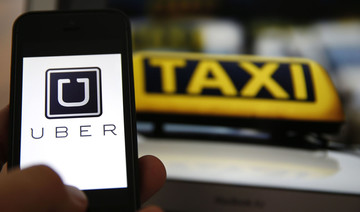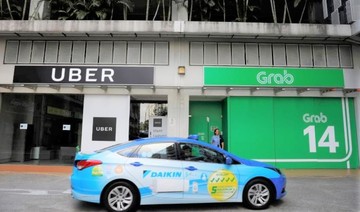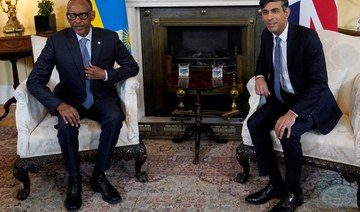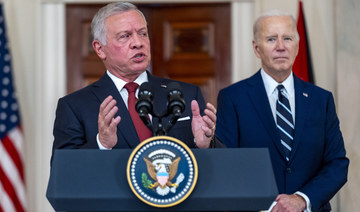KABUL: Booking a ride that picks you up from your doorstep has been a dream for many Afghans for a long time. The dream is now coming true. After the popular ride-hailing services such as Uber and Careem declined to run on Afghanistan’s chaotic and unmapped roads, a private national firm came up with a local solution: Buber.
Currently on its test run, the service will be officially launched in Kabul in January 2019.
Basharmal Dawlatzai, a Buber driver, says the initiative in a congested city where violence and criminal activities have been part of daily life for years, is a relief for both clients and drivers.
“It is very convenient for both sides, the customer does not need to walk to a street, wait for taxi in cold or hot weather and bargain with a taxi he or she does not know,” Dawlatzai told Arab News. “We go to their homes and drop them at their favored destination, which saves both sides time and hassle.”
He has been with Buber for two months and has taken around employees of Afghanistan’s Holding Group (AHG) that owns Buber, which in Dari means “Take me”.
AHG’s headquarters near the ancient Darul-Aman palace is tucked away behind blast walls with a sprawling compound that enjoys far better security measures than many state institutions which are the targets of routine attacks by militants in Afghanistan.
The security precautions at AHG include a series of body searches by armed guards as well as scanners and the layers of checks that make it look as if the compound is in top-secret location.
There is a different world and mood inside, and for a moment you may think that this is not Afghanistan, given the pace of its work and manner of efficiency. Groups of young sleek men and women are busy typing away on computers or discussing their regular daily activities.
AHG hopes to gallop and make Afghanistan catch up with the revolution in the field of technology that has spread across the globe in recent years.
Staff at AHG say that since its launch in 2009 the company has provided professional business services to more than 700 organizations across Afghanistan. Its clients range from small companies, non-profits and corporations to development institutions and government customers. It offers a range of services that include legal and human resources support and assistance with licensing, visas, payroll, taxation, audit and procurement.
Now, AHG is working on its new innovation, Afghanistan Technology Services (ATS), which covers Hesab (accounting) and Buber, online taxi ordering similar to Uber.
The Hesab application allows customers to pay online power and water bills and order goods for home delivery, as well as paying for Buber.
The online car ordering has been operating in Afghanistan for several years, but business is tailing off for the other two firms, which according to officials had not managed to develop an advanced application.
“Technology is taking over each and every thing across the world, we do not want to be behind those guys and we would like to reach somewhere and rebuild Afghanistan. This is our mission, to rebuild Afghanistan,” said Zaheeruddin Naeabkhail, Buber’s senior manager.
Until its launch in January Buber is on a test run to make sure that the application works smoothly. It has enlisted 500 vehicles, with Kabul being the immediate target, and with the intention to expand to other major cities later.
Not many will be able to afford the Buber service: Smart phone owners and literate people are its target.
Even the drivers will have to be literate.
In a country where there is no fixed rate for taxis and customers usually bargain, Buber will have fixed prices and can come to a customer’s desired address for pick up.
In a country riven by violence and crimes, such as abductions, Buber can offer peace of mind to clients as it has a tracking mechanism which clients can share with anyone they want to for their safety, AHG officials said.
“The problem for now in the market is the security concern. We have this facility for the user as well as the driver that allows them to be able to track users through our GPS,” Naeabkhail said.
Drivers will be registered with full details for security measures and they can help the police with information if anything happens to a client between pickup and drop-off.
The application can be a great help for the customer to avoid congested areas and routes where there is protest or there has been an attack, officials said, adding this will save time for the client and money for the driver, as well as reducing pollution.
“This application is very challenging application, nobody else has it, it is not easy for others to build it easily. Afghans have developed the application themselves,” Naeabkhail said.
Roadblocks created by officials, some embassies, foreign troops and factional leaders are the key challenges and Buber hopes to address that with the help of Google, he said.
“The main challenge that we face is the map, because Afghanistan is not mapped very well. We would like the support of Google if they are willing to help us … it is like general support for the public at large and also for any company that comes later and invests.”
Buber picks up the taxi challenge on the streets of Kabul
Buber picks up the taxi challenge on the streets of Kabul
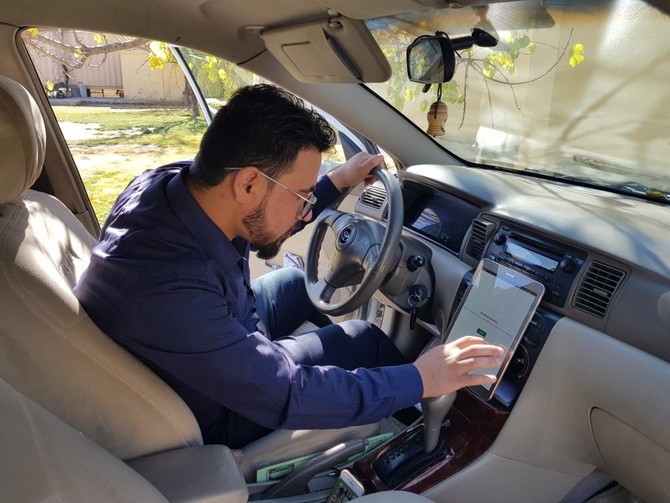
- Popular ride-hailing services such as Uber and Careem declined to run on Afghanistan’s chaotic and unmapped roads
- Buber will be officially launched in Kabul in January 2019
Pro-Palestine Oxbridge students set up encampments

- They are demanding transparency about the universities’ financial links to Israel
- ‘We will not move until our demands are met’
LONDON: Students at the universities of Oxford and Cambridge have set up encampments in support of Palestine, The Times reported on Monday.
Around 50 have refused to leave the lawn of King’s College, Cambridge, while students have also declared a “liberated zone” outside Oxford’s Pitt Rivers Museum.
A banner hung outside King’s College read: “Welcome to the people’s university for Palestine.” Chants of “stop the bombing now” have also been heard on the campus.
The protests have been organized by Oxford Action for Palestine and Cambridge for Palestine.
They are demanding transparency about the universities’ financial links to Israel, which they have described as a “settler colonial state,” and are calling for the end of all investments and endowments from Israeli and Israel-linked companies.
“We have set up camp in university grounds, and we will not move until our demands are met,” the groups said in a statement, adding that the universities are legitimate targets for protests because of their “role in the British empire and its disastrous colonial legacies.”
The Times reported that protesters had been given an itinerary for their involvement including “de-escalation training” and “banner-making.”
A spokesperson for Cambridge University said it is for the college to decide whether to call the police, adding: “The university is fully committed to academic freedom and freedom of speech within the law and we acknowledge the right to protest.
“We ask everyone in our community to treat each other with understanding and empathy. Our priority is the safety of all staff and students.
“We will not tolerate antisemitism, Islamophobia and any other form of racial or religious hatred, or other unlawful activity.”
The relatively small UK protests come after nearly 2,000 people were arrested across the US after widespread demonstrations on over 130 American university campuses about Israel’s ongoing war in Gaza.
Muslim group issues UK Labour Party leader with demands over Gaza
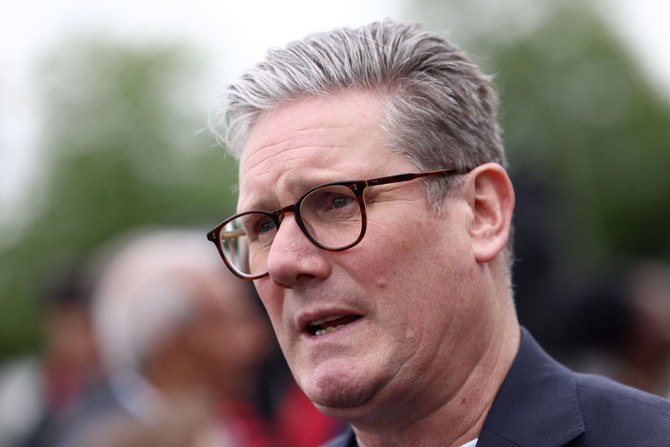
- Muslim Vote group calls for ‘real action’ to regain trust
- Support for Labour in recent local elections fell in areas with high Muslim populations
LONDON: Pro-Palestinian activists have presented a list of 18 demands to the leader of Britain’s opposition Labour Party and said they will not vote for the party at the next general election if he does not fulfill them.
The Muslim Vote, a campaign to get Muslim voters to back pro-Palestine candidates, has called for Sir Keir Starmer to promise to cut military ties with Israel, implement a travel ban on Israeli politicians involved in the war in Gaza and impose sanctions on companies operating in occupied territories.
The group told Starmer he must commit to “real action” and deliver on its requests if he was “serious” about his pledge to rebuild trust with those angered by his stance on the conflict in Gaza, The Telegraph reported.
Supporters would vote for the Green Party or Liberal Democrats if he could not commit to their demands, it said.
Labour’s campaign chief Pat McFadden acknowledged that Starmer’s approach to the conflict had cost the party votes at last week’s local elections. Support for Labour dropped dramatically in areas with a high Muslim populations, including Oldham in Greater Manchester, where the party lost overall control of the council in a shock defeat.
After the result, Starmer said he was determined to regain the trust of those who abandoned Labour as a result of his stance on the Gaza war but did not make any concrete pledges on the matter.
The Muslim Vote challenged Starmer with committing to the 18 demands and implementing them should he become the next prime minister.
They include removing the definition of extremism introduced by Secretary of State for Leveling Up, Housing and Communities Michael Gove and issuing guidance that allows Muslims to pray at school.
Philippines rules out use of water cannon in disputed South China Sea

- Philippines and China have clashed several times in disputed, resource-rich waterway
- Latest skirmish took place late last month, in an incident Manila describes as dangerous
MANILA: President Ferdinand Marcos Jr. said on Monday that Manila will not use offensive equipment in the disputed South China Sea, after China’s coast guard used high-pressure water cannon on Philippine vessels last week.
The Philippines and China have had several confrontations in the resource-rich area, where Beijing has used water cannon against Filipino vessels in incidents Manila has described as harassment and dangerous.
The latest in a string of maritime clashes occurred on April 30 as tensions continued to rise in the vital waterway that Beijing claims almost in its entirety despite a 2016 international arbitration ruling that rejected its assertion.
“What we are doing is defending our sovereign rights and our sovereignty in the West Philippine Sea. And we have no intention of attacking anyone with water cannons or any other such offensive (weapons),” Marcos said Monday.
“We will not follow the Chinese coast guard and the Chinese vessels down that road because it is not the mission of the navy (or) our coast guard to start or to increase tensions … Their mission is precisely the opposite, it’s to lower tensions.”
Philippine vessels have been regularly targeted by Chinese ships in areas of the South China Sea that are internationally recognized as belonging to the Philippines, which Manila calls the West Philippine Sea.
The Philippines’ Ministry of Foreign Affairs last Thursday summoned Zhou Zhiyong, China’s deputy chief of mission, after the incident left a Philippine coast guard vessel and another government boat damaged.
It was the 20th protest Manila has made against Beijing’s conduct in the South China Sea this year alone, while more than 150 diplomatic complaints have been made over the past two years.
Marcos said the Philippines will continue to respond to South China Sea incidents through diplomatic means.
Marcos’s statement comes days after the defense ministers of the Philippines, the US, Japan and Australia met in Hawaii and issued a joint statement on their strong objections to the “dangerous and destabilizing conduct” of China in the South China Sea.
UK considered Rwanda-style asylum deal with Iraq
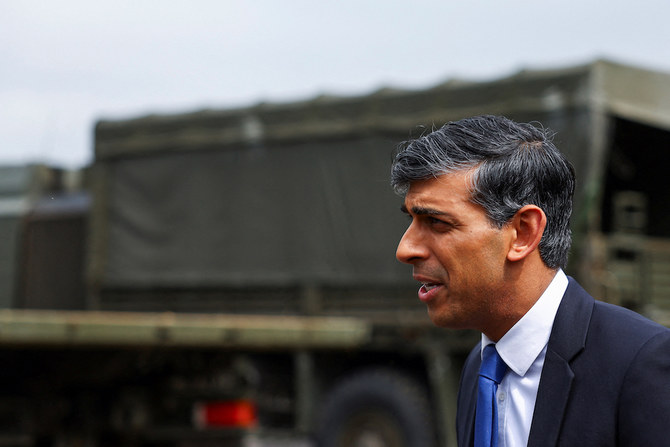
- Documents seen by Sky News reveal London has struck returns agreement with Baghdad
- They also suggest a desire to improve relations with Iran to return people to the country
LONDON: The UK considered sending asylum-seekers to Iraq for processing, new documents have shown.
Iraq is considered very dangerous, with the UK government advising against all travel to the country.
But a plan similar to the Rwanda scheme to process migrants in a third-party country was floated at one stage by Whitehall officials, with negotiations said to have achieved “good recent progress.”
The UK has struck a returns agreement with Baghdad for Iraqi citizens, which was achieved without a formal announcement or acknowledgement and a plea for “discretion,” the documents, seen by Sky News, suggest.
The cache of papers casts new light on the UK government’s approach to dealing with asylum-seekers and illegal migration, including a desire to improve relations with the Iranian Embassy in London in order to ease the repatriation of Iranian citizens, and moves to establish return agreements with Eritrea and Ethiopia.
Biden meets Jordan’s King Abdullah as Gaza ceasefire hopes dim
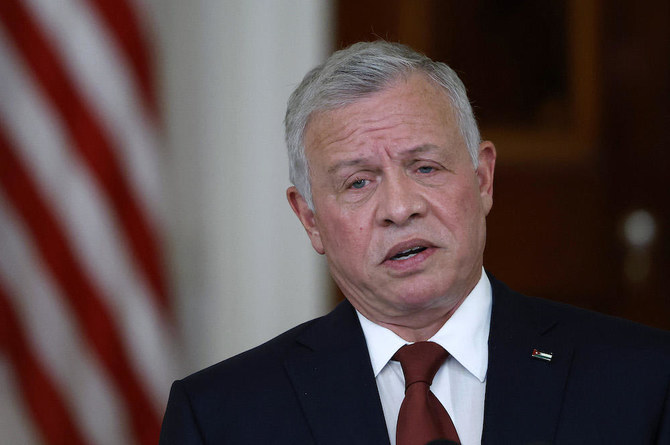
- Monday’s meeting between two leaders is not a formal bilateral meeting but an informal private meeting
- US president Biden faces increasing pressure politically to convince Israel to hold off on an invasion
WASHINGTON: President Joe Biden will meet Middle East ally, Jordan’s King Abdullah II, at the White House on Monday with prospects for a Gaza ceasefire appearing slim and Palestinian Islamist group Hamas and Israeli officials blaming each other for the impasse.
On Sunday, Hamas reiterated its demand for an end to the war in exchange for the freeing of hostages, and Israeli Prime Minister Benjamin Netanyahu flatly ruled that out. Hamas also attacked the Kerem Shalom crossing into Gaza that Israel said killed three of its soldiers.
A Jordanian diplomat said Monday’s meeting between Biden and King Abdullah is not a formal bilateral meeting but an informal private meeting. It comes as the Biden administration and Israeli officials remain at odds over Israel’s planned military incursion in Rafah.
Biden last met King Abdullah at the White House in February and the two longtime allies discussed a daunting list of challenges, including a looming Israeli ground offensive in southern Gaza and the threat of a humanitarian calamity among Palestinian civilians. Jordan and other Arab states have been highly critical of Israel’s actions and have been demanding a ceasefire since mid-October as civilian casualties began to skyrocket. The war began after Hamas stunned Israel with a cross-border raid on Oct. 7 in which 1,200 people were killed and 252 hostages taken, according to Israeli tallies.
Biden last spoke to Netanyahu on April 28 and “reiterated his clear position” on a possible invasion of the Gaza border city of Rafah, the White House said. The US president has been vocal in his demand that Israel not undertake a ground offensive in Rafah without a plan to protect Palestinian civilians.
With pro-Palestinian protests erupting across US college campuses, Biden faces increasing pressure politically to convince Israel to hold off on an invasion. Biden addressed the campus unrest over the war in Gaza last week but said the campus protests had not forced him to reconsider his policies in the Middle East.



